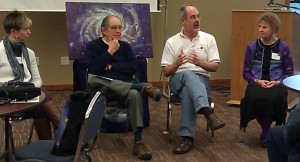Tevye’s Lament

Ecology of Grace and Justice: Organizing in the BioCommons Presentation February 22, 2013
St. Andrew Lutheran Church, Beaverton, OR
Bishop Dave Brauer-Rieke, Oregon Synod, ELCA
Like a Fiddler on the Roof
Our understanding of the world is in a rapid state of change. Global warming, resource depletion, mass extinctions, and lack of a planetary vision for addressing these issues are killing the earth. How is the Christian to respond to this crisis? Does the Church have the spiritual and theological where-with-all to respond in a meaningful manner? Is the end at hand, or will Christians take up their cross and follow an uncertain path to an elusive future?
My thoughts in this paper center on a spiritual “re-phrasing, re-framing and re-imagining” of Christian faith and life. Let us start with our brother Tevye who, in Fiddler on the Roof, danced the adaptive dance of faith and life in changing times.
Re-phrasing the Future
“Is this the little girl I carried? Is this the little boy at play? I don’t remember growing older, when did they? When did she get to be a beauty? When did he grow to be so tall? Wasn’t it yesterday, when they were small? Sunrise, sunset Sunrise, sunset Swiftly flow the days Seedlings turn overnight to sunflowers Blossoming even as we gaze Sunrise, sunset Sunrise, sunset Swiftly fly the years One season following another Laden with happiness and tears.”(“Sunrise, Sunset” from Fiddler on the Roof) Copernicus and Galileo told the world some 400 years ago that the sun does not rise and set. Rather, in a heliocentric universe, the sun is revealed and obscured by a rotating earth. We rightly cringe at the Roman Inquisition that condemned Galileo of heresy in 1615. Catholicism has, of course, slowly reversed its position on Galileo through the 19th and 20th centuries. Yet, in a speech delivered at the Sapienza University of Rome February 15, 1990, the future Pope Benedict XVI quoted philosopher Paul Feyerabend in saying “The Church at the time of Galileo kept much more closely to reason than did Galileo himself, and she took into consideration the ethical and social consequences of Galileo’s teaching too. Her verdict against Galileo was rational and just and the revision of this verdict can be justified only on the grounds of what is politically opportune.”Feyerabend’s assertion seems strangely antiquated. Yet, we ourselves, singing “Sunrise, sunset. . .” rather than, “Reveal, Obscure. . .” cling to familiar images that comforts us. People long for metaphors that speak on a “human” scale. To abandon or revise such history would indeed have “ethical and social consequences.” At the same time, to perpetuate an outmoded science, mythology or theology also has its costs.
There are those who would say that Christianity cannot meaningfully address our present day environmental crisis. I would argue that our rich Christian heritage must be honored and preserved. Devaluation of the past has significant ethical and social consequences. Our modern Cosmic Creation Story itself models such preservation, as does the very DNA of life. In the same way, our traditional Christian theology with its “Sonrise” centric focus must not be lost. All that is and will be comes from what has been. However, new songs need to be written that bring the old, old story into congruence with the emerging truths of modernity.
How are these poems different to your ears?
Seasons of Rest*
Day is over, sun has set
Prayers to God release regret
Sabbath hours give us rest
While angels guard a swallow’s nest
Soon to life the sun will rise As with fresh hope we’ll rub our eyes Once again the world engage Blessed by love or pained by rage
Galileo’s Glee*
Passing now the torch of day Shadows cast along the way Day released, new stories told And while I rest your life unfolds Soon again to me revealed Light of day and what Earth’s healed All that was becoming more Risen Christ, new life adore[Note from Admin: After contemplating the question posed to us above by Bishop Dave, the second of this two-part series continues tomorrow with “Reframing the Faith.”]
_____
* both poems by Bishop Dave Brauer Rieke
__________________________
To sign up to receive these Lenten reflections and subsequent blog posts directly to your email account click here or on the link in the upper left sidebar of any page at test.ecofaithrecovery.org. Please feel free to share this post with others and use the comment field below the post your thoughts on this topic. Thanks!
